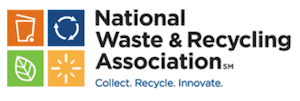NWRA’s Northern New England Chapter Commends Vermont Governor for Veto of Bottle Bill Expansion
Arlington, VA – The Northern New England chapter of the National Waste & Recycling Association (NWRA) commends Vermont Gov. Phil Scott (R) for his veto of H. 158, legislation that would expand the state’s bottle bill law. The legislation would have covered most beverages, except dairy products, by 2027. The bill also included wine bottles, which could have been redeemed for 15 cents. The legislation also would have created a producer responsibility organization system that all manufacturers would have to join if they want to sell their products in Vermont.
“We thank Gov. Scott for his leadership and veto,” said Lew Dubuque, vice president of chapter relations for NWRA. “We opposed this expansion because it would disrupt existing recycling infrastructure in the state and cause an economic burden to Vermont taxpayers.”
In his veto message, Scott stated he believed “expanding the labor-intensive 1970s-era bottle deposit system would move us backward, and we should instead focus on investing in and improving zero-sort (or blue bin) recycling.”
NWRA testified in April that expanding the bottle bill would harm recycling due to the fact that the containers targeted for the expansion are currently being managed effectively in local recycling programs. “Without these valuable recyclable containers in the general recyclables stream, the cost to municipalities, and ultimately Vermont resident taxpayers, to continue their recycling programs will assuredly go up,” NWRA said in its testimony. “The state of Vermont is already a recognized leader in recycling, and this is due mainly to curbside service. Expanding the bottle bill will only hurt that.”
NWRA released a study that evaluates the impact of bottle bills on materials recovery facility (MRF) costs and revenues and those impacts on municipalities. The study found that although deposits do lead to substantially greater recovery overall, they also lead to higher costs and lower revenues at the MRFs as high-value materials move to the deposit system and out of the MRF. The research estimates that municipalities will see an increase of approximately $2.50 to $5 per household per year in MRF costs, depending on the deposit scenario.
###
ABOUT NWRA
The National Waste & Recycling Association (NWRA) represents the private sector waste and recycling services industry. Association members conduct business in all 50 states and include companies that manage waste, recycling and medical waste, equipment manufacturers and distributors, and a variety of other service providers. For more information about NWRA, please visit www.wasterecycling.org.
Contact
Brandon Wright
National Waste & Recycling Association
bwright@wasterecycling.org
202-364-3706

